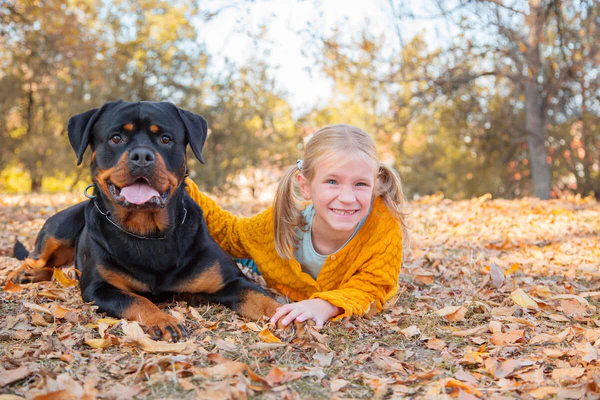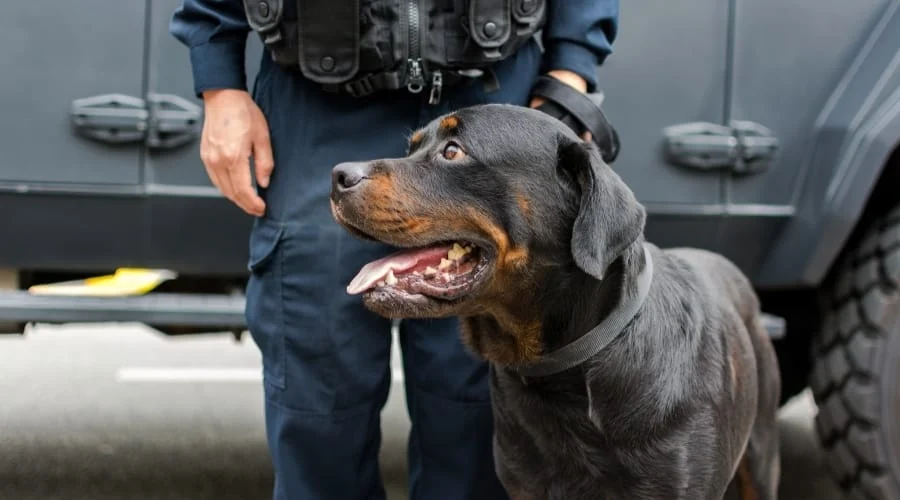
Rottweilers and Families: Are They Good with Children?
Rottweilers are known for their strength, loyalty, and protective nature, but when it comes to family life, particularly with children, there are some things you should consider. The Rottweiler’s temperament and behavior can vary, and understanding their unique traits can help you determine if they are a good fit for your household.
Let’s explore the relationship between Rottweilers and children, covering their temperament, how to introduce them to kids, and the important steps you can take to ensure a safe and happy relationship.
Rottweilers and Their Temperament: A Protective and Loyal Companion
Rottweilers are often misunderstood due to their imposing stature and protective instincts. However, their temperament is generally calm, confident, and protective, which makes them excellent companions when trained properly.
- Loyal and Protective: Rottweilers are known for their unwavering loyalty to their family. They are naturally protective of their loved ones, which can be an asset when it comes to guarding the home. However, their protective instincts mean they may not immediately warm up to strangers or unfamiliar children. It’s important to manage these instincts with early socialization.
- Calm and Confident: Rottweilers are usually calm and confident in their demeanor, especially when they are raised in a stable and loving environment. While they may be playful, they tend to be less excitable than some other breeds, which is ideal for a family dynamic.
- Not Aggressive by Nature: While Rottweilers have a reputation for being tough and formidable, they are not naturally aggressive. Like all dogs, they are heavily influenced by their upbringing, training, and socialization. A well-trained Rottweiler will be gentle and friendly, especially with children.
Are Rottweilers Good with Kids?
Rottweilers can make wonderful family pets, and many are excellent with children. However, their suitability for a family with kids depends on several factors, such as their early socialization, training, and individual temperament.

What You Need to Know About Rottweilers and Kids:
- Early Socialization is Key: Rottweilers that are raised around children from a young age are more likely to develop a strong bond with them. Early socialization helps the dog learn how to interact with kids and understand boundaries. It’s essential to expose your Rottweiler to children of all ages to teach them how to behave around them properly.
- Size and Strength: Rottweilers are large and strong dogs, which can be intimidating for smaller children. Their size and strength mean they could accidentally knock over a toddler or unintentionally cause harm if they’re not properly trained. Teaching children how to interact with the dog—such as no rough play or pulling on the dog’s ears—can ensure a safer environment for both the child and the dog.
- Temperament of the Individual Dog: Each Rottweiler is unique, and their individual temperament plays a significant role in how they interact with children. While some Rottweilers are naturally calm and affectionate, others may need extra training to adapt to a household with young kids. A well-socialized and balanced Rottweiler is more likely to enjoy being around children, while a dog with more anxiety or territorial instincts may be more reserved.
- Supervision is Important: Even if your Rottweiler is great with children, supervision is still important. Children can sometimes be unpredictable in their behavior, and it’s vital to monitor interactions between them and the dog. Always supervise playtime and teach both your child and the dog proper boundaries.
Introducing a Rottweiler to Children: Steps for a Smooth Transition
If you’re planning to bring a Rottweiler into a home with children, or if you already have a Rottweiler and are introducing them to a new child, there are several key steps to follow to ensure a positive experience for everyone:
- Gradual Introduction: Introduce your Rottweiler to the child in a calm, controlled environment. Let them approach the dog slowly and avoid overwhelming the dog with sudden movements or loud noises. The first few interactions should be calm and positive, with plenty of praise for good behavior.
- Teach Boundaries to Both the Dog and Child: It’s important that both your child and the dog understand boundaries. Teach your child how to properly approach the dog, avoid pulling on ears or tails, and refrain from disturbing the dog while it’s eating or resting. Likewise, ensure your Rottweiler understands the boundaries by rewarding calm behavior around the child and discouraging any rough play.
- Positive Reinforcement: Reward both your Rottweiler and your child with positive reinforcement when they interact well together. For example, give the dog treats for staying calm around the child and encourage your child to show affection gently. This can help the dog learn that being around kids is a rewarding experience.
- Teach Respect: Both the dog and the child must learn to respect each other’s space. While Rottweilers are generally tolerant, they can get stressed or agitated if they feel threatened or overwhelmed. Likewise, children need to understand that dogs are not toys and should not be treated roughly.
- Ongoing Training: Training your Rottweiler should be a continuous process, especially when it comes to interactions with children. Reinforce commands like “sit,” “stay,” and “leave it,” to ensure you have control over the situation. A well-trained dog is less likely to engage in unwanted behaviors, making interactions with children safer.
Tips for Keeping Your Rottweiler and Children Safe
To ensure the safety and well-being of both your Rottweiler and your children, consider these additional tips:
- Supervise Playtime: Always supervise your dog and kids when they’re playing together, especially with younger children. Even the gentlest Rottweilers can get overexcited or accidentally cause harm during play.
- Provide a Safe Space: Make sure your Rottweiler has a designated space to retreat to if they feel overwhelmed. This can be a crate or a quiet area of the house where they can relax without being disturbed by the children.
- Teach Kids How to Respect the Dog: Children need to understand that dogs are not playthings. Teach your kids how to read the dog’s body language and respect when the dog needs a break.
- Health and Wellness: Keep your Rottweiler healthy with regular vet check-ups, proper nutrition, and plenty of exercise to ensure they’re in a good mood and temperament to interact with your family.
Conclusion: Are Rottweilers Good with Children?
When properly trained, socialized, and cared for, Rottweilers can make fantastic family pets and are often excellent companions for children. Their loyalty, protectiveness, and calm demeanor make them a great choice for families, especially if you have older children who can understand the importance of respecting a dog’s space.
If you’re considering adding a Rottweiler to your family, make sure to provide them with the necessary training and supervision to ensure they and your children coexist safely and happily. With the right guidance, your Rottweiler can become an affectionate and loving member of your family, creating memories and building bonds with your kids for years to come.
What’s your experience with Rottweilers and children? Share your thoughts in the comments below!







